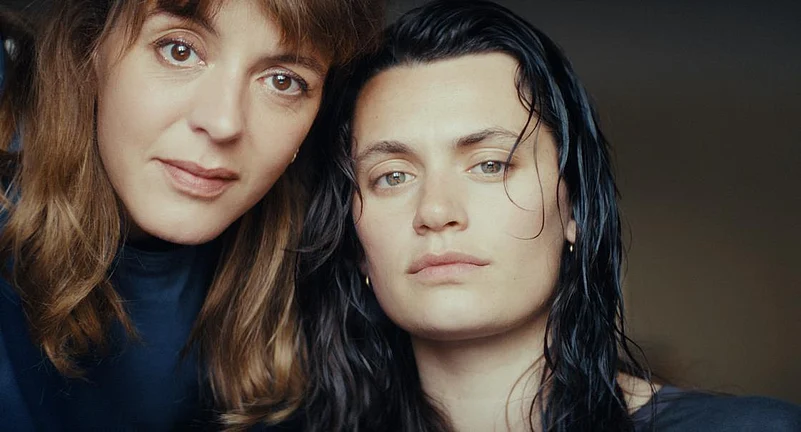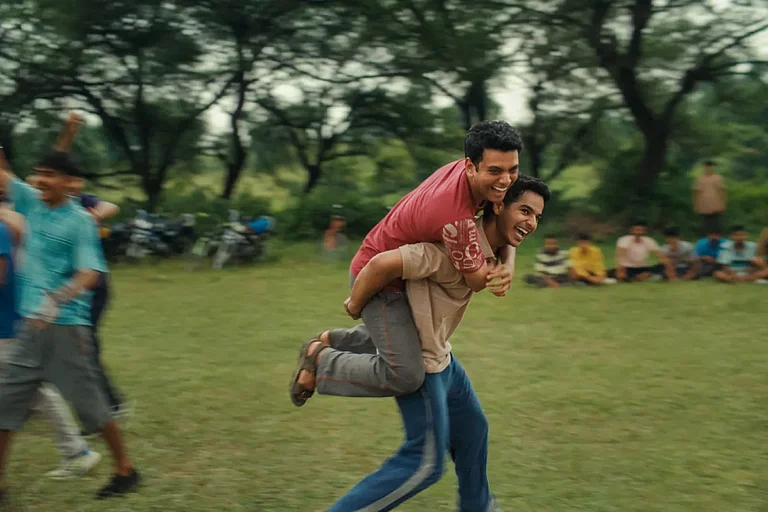Céline is sifting through photos on her computer, looking for one with her mother. She chances upon an old interview of hers. “Your daughter is seven,” the reporter says. “Yes,” replies Marguerite. “How do you organise family life as an artist?” comes the question. “My husband no longer works,” Marguerite says with a smile. “He plays a big role in our daughter’s upbringing. They’re together all the time, in Munich, and me too, but I’m often away.” Céline is joined by Nadia as she appears visibly stricken, while watching her mother talk about her absence as a parent. “Being apart must be difficult,” the interviewer muses. “For me or for them?” Marguerite wonders, still smiling. “For everyone, I suppose,” the reporter says. “Absence is one thing, it’s the reunion that’s hard. Yes, the reunions. At times, I hold my daughter, and she’s not ready. Other times, the opposite.” “An undanceable waltz,” comments the reporter. “Like all of Chopin’s waltzes,” quips Marguerite, as Céline looks on, disillusioned, cold.
Alice Douard’s directorial debut Love Letters (Des preuves d'amour), part of the Semaine De La Critique at Cannes 2025, is a stirring journey through the dilemmas that constitute parenting. Set in Paris, 2014, when same-sex marriages were legalised in France, it lays threadbare, in all honesty, the oft-unspoken uncertainties around owning the responsibilities that come with being a parent. Through the yearning of its protagonists—Céline (Ella Rumpf) and Nadia (Monia Chokri)—for their bond to be recognised by the law, the society, their friends and family, the challenges of queer existence in an exasperatingly heteronormative world emerge with quiet vulnerability in this unpretentious French drama.

The film opens at a crescendo, when the National Assembly votes on the law for same-sex marriage are being counted. As the votes in favour of the law are won, there is pomp and celebration. The film follows in the aftermath of this moment—a glimpse into what happens when the noise dies down. Céline, a DJ and musician, is mandated by the law to adopt the child that Nadia is bearing, to earn the legal designation of a ‘mother’. The couple collectively chooses Nadia to bear their first child as she is older—a decision that is up for contestation on multiple occasions through the film. For Céline to be able to adopt, she requires a slew of testimonies from friends and family, affirming that she is capable of parenting a child. Herein begins the arduous process of convincing their loved ones to certify their motherhood, even before the child is born. But the complication has just about started—their lawyer suggests that Céline’s case will be strengthened by a testimony from her mother, the famous pianist Marguerite Orgen (Noémie Lvovsky). It seems like logical reasoning, except Céline’s relationship with Marguerite is strained beyond much hope.
Love Letters explores the delicate turmoil that besieges Céline—as a mother-to-be but not quite. She straddles an emotional quagmire as she undertakes a whirlwind of tasks to establish her competence as a mother. She offers to babysit for her friend to gain hands-on experience of handling babies and toddlers, while attempting to take off her relationship from where she left it with her mother. She participates in hospital tours and Lamaze classes with Nadia, while trying to sit through exacting meals with her family, who is still adjusting to their daughter’s lesbian identity.
Nadia, on the other hand, struggles with Céline’s absence owing to the late nights that her profession as a DJ demands. She must deal with the trying state of mind the Céline finds herself in, while also taking care of herself through the pregnancy. She has to find a way to navigate the discomfort her family feels with her queerness, while making sure not to alienate them as their testimony carries weight in Céline’s legal adoption process.
Through the highs and lows of their partnership, Céline still reluctantly looks to make amends with her mother. It’s a heartbreaking dilemma—to seek love from a figure that she is trying desperately to not become, for her own child and partner. Herein Douard grasps the pulse of the film, by bringing in the diverse soundtrack as a character in the narrative that seeks harmony where the notes have fallen astray. The stunningly brilliant music of Love Letters, which comprises the best of both worlds—contemporary electronic as well as classical music—enriches the film’s premise, often standing in for what the characters, especially Marguerite, are unable to express to each other. Marguerite—who is unable to pull Céline out of the relic of abandonment that she carries as her childhood—empties her heart instead, through her fingers into the piano.
The camera remains an unassuming presence in the room, following the anxieties of the protagonists calm and steady. The film is captured in an organic fashion, where the sharp play with shadows and light spells out the tensions that constantly brew in the hearts of the characters. The remarkable editing by Pierre Deschamps keeps you hooked throughout, as you find yourself palpably involved in the ebbs and flows of their intimacies and vulnerabilities. Love Letters is a film with heart that emerges through the crevices that legislations leave unheeded in their rigidity. It moves beyond the premise of mere ‘acceptance’ of difference in a monolithic society; through a delicately woven frame, it makes a firm demand for an upheaval, a re-imagination of language that can articulate states of being that transcend normativity.
Love Letters Screened at the Critics’ Week at Cannes 2025.

















